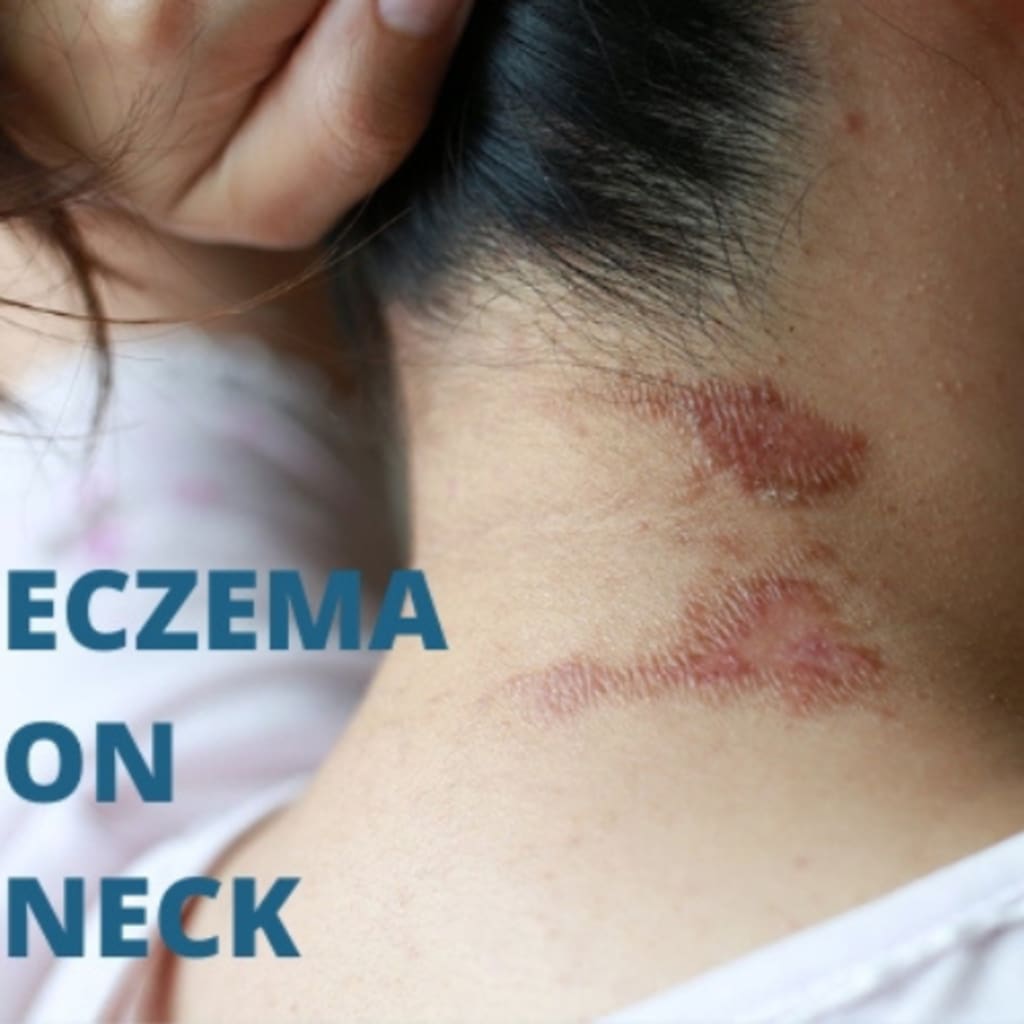Is it Eczema on the Neck or Atopic Dermatitis?
Eczema on the Neck

Overview
When skin conditions seem up similar, it might be perplexing. Two such conditions are atopic Dermatitis and eczema. Accurate diagnosis and treatment may make it easier if you know the main differences and similarities between these two. Let's examine the subtleties of both eczema and atopic Dermatitis, particularly as they affect the neck.
What exactly is eczema?
The term "eczema" is generally employed to describe a variety of skin conditions that present with red, itching, and inflammatory skin. To this day, numerous individuals worldwide have been afflicted by these skin disorders. Inflammation-induced dry, red, and itchy skin are the hallmarks of dermatitis, which is another term for Dermatitis. Although eczema can affect any region of the body, it is most frequently observed in the hands, neck, face, and legs. Red or brownish-gray areas, dry and sensitive skin, swelling, rough, leathery, or scaly regions, and prolonged itching are typical symptoms.
Atopic Dermatitis:
The most common kind of eczema, atopic Dermatitis, is a chronic disease that frequently starts in childhood and can last into adulthood. This chronic condition makes the skin irritable, itching, and cracked. Among the atopic group of diseases that also includes hay fever and asthma is atopic Dermatitis.
Typical signs include intense itching, particularly at night; red or brownish-gray patches, especially on the neck, wrists, ankles, and inside the elbows and knees; tiny, raised lumps that may leak fluid and crust over when scratched; and thickened, cracked, or scaly skin.
Eczema vs. Atopic Dermatitis
Eczema and atopic Dermatitis are somewhat different conditions, even though they share similar symptoms. Among the various skin disorders collectively known as eczema is atopic Dermatitis. The primary difference is that, often, atopic Dermatitis is more severe and enduring than other forms of eczema. Knowing the reasons will help you distinguish between eczema and atopic Dermatitis.
Reasons of Eczema
Eczema is a skin condition characterized by inflammation and itching. Eczema is mostly inherited since it often runs in families. Environmental factors also greatly worsen eczema. Stress can aggravate symptoms, as can skin irritation and harsh soaps and detergents. Weather changes, particularly very hot and humid days, can significantly aggravate eczema. Furthermore, flare-ups can be brought on by allergens such as pet dander and pollen. People who suffer from eczema must, therefore, carefully manage their environment.
Reasons of Atopic Dermatitis
Eczema's close cousin, atopic Dermatitis, is impacted by a number of environmental and genetic variables. A family history of atopic diseases like hay fever and asthma makes a strong genetic component clear. Furthermore important are ecological stimuli. Atopic Dermatitis can be made worse or started by things like dry skin, stress, pollen, pollution, and specific foods and allergies.
Identifying Eczema on the Neck
Because eczema on the neck often worsens symptoms, identifying it on the neck might be difficult. Usually, these symptoms are dry, scaly skin, severe itching, and red, inflamed spots. Eczema of the neck often shows up as red or brownish-gray patches. These patches can get thick and leathery with time if they are scratched, which makes the problem much more uncomfortable.
Identifying Atopic Dermatitis on the Neck
Accompanying typical eczema symptoms, atopic Dermatitis on the neck is distinguished by its more severe and enduring symptoms. Strong itching, especially at night, red, swollen spots, and cracked, scaly skin are the main symptoms. Though it often manifests with larger afflicted skin patches and more acute inflammation, atopic Dermatitis on the neck might mimic eczema visually.
Diagnosis and Medical Consultation
Getting the proper care depends on an accurate diagnosis; hence, if you think you have a medical problem, get medical help right away. If you have substantial redness and swelling, ongoing itching and pain, or if over-the-counter medications do not help, you should consult a doctor.
Diagnostic Process for Eczema
A doctor will initially do a physical exam to diagnose eczema, closely examining the afflicted skin and inquiring about symptoms and family history. To rule out other disorders, they could occasionally additionally do a skin biopsy.
Diagnostic Process for Atopic Dermatitis
Much as with eczema, atopic dermatitis diagnosis requires a comprehensive physical examination and a comprehensive patient history. To pinpoint any triggers that might be aggravating the illness, allergy testing may also be advised.
Nursing Options
Both conditions need a specialized approach to available treatments. Hydrators, anti-itch creams, and hydrocortisone creams are some of the over-the-counter treatments. Prescription medications include things like steroids, antibiotics for infections, and immunosuppressants.
Nursing for Eczema
Usually, eczema treatment combines lifestyle modifications with topical medications. While topical corticosteroids lower inflammation, emollients maintain skin hydration. The problem can also be much improved by changing one's lifestyle to avoid recognized triggers and to keep up a regular skincare regimen.
Nursing Atopic Dermatitis
Treatment for atopic Dermatitis includes lifestyle modifications as well as topical medications. In order to control symptoms and lower inflammation, topical therapies frequently include harsher steroid creams and calcineurin inhibitors. Managed Atopic Dermatitis also heavily depends on lifestyle modifications. This includes recognizing and avoiding triggers for flare-ups and maintaining skin moisture levels to preserve barrier function and lessen dryness.
Preventative Tactics
Because controlling these disorders mostly depends on prevention, taking preventative action is crucial. Including moderate, fragrance-free skincare products into a daily regimen and routinely moisturizing cream can assist in preserving healthy skin. Furthermore, it is important to recognize and stay away from recognized triggers. Keeping the surroundings dust- and dirt-free might reduce the possibility of flare-ups even further.
Conclusion
Good treatment depends on knowing the distinctions between atopic Dermatitis and eczema. Though these disorders can have a big negative influence on your quality of life, they can be lessened with the appropriate treatment. Seek expert counsel whenever possible to ensure a correct diagnosis and course of therapy.
About the Creator
khurram
I am a research enthusiast and research a variety of topics. During my research, I feel the need to express my thoughts in words and inform other people with the knowledge that I have. So, I started content writing as my full-time job.
Enjoyed the story? Support the Creator.
Subscribe for free to receive all their stories in your feed. You could also pledge your support or give them a one-off tip, letting them know you appreciate their work.





Comments
There are no comments for this story
Be the first to respond and start the conversation.